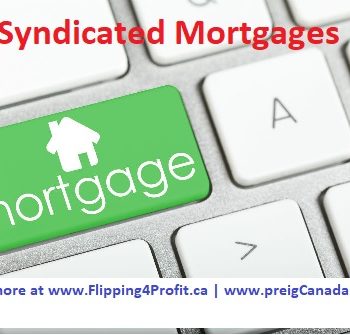Changes to Ontario syndicated Mortgages
transactions take effect July 1, 2018. Professional real estate investors shall become aware of these changes to Ontario syndicated mortgages.
What is a Syndicated Mortgage
A syndicated mortgage is where several
investors combine funds together to
create one financial instrument:
a mortgage. When you invest in a
syndicated mortgage, you are pooling
your money with others to create a
mortgage that will be registered
and secured directly with the land
or building that’s associated with
that mortgage.

The Government of Ontario has made regulatory amendments to O. Regulation 188/08 Mortgage Brokerages Standards of Practice[New Window] under the Mortgage Brokerages, Lenders and Administrators Act, 2006 (MBLAA)[New Window] that affect non-qualified syndicated mortgages.
Changes to Ontario Syndicated Mortgages
Under the MBLAA, mortgage brokerages are already required to take reasonable steps to ensure that a mortgage or an investment in a mortgage is suitable for a client (i.e., borrower, lender or investor) based on the needs and circumstances of the client. Brokerages are also required to provide clients with certain disclosures, including written disclosure of the material risks of a mortgage or investment in a mortgage.
As of July 1, 2018, mortgage brokerages that deal with non-qualified syndicated mortgage transactions will have to comply with expanded requirements.
Developers and builders use syndicated mortgages
as part of their financing to take a project
from conception to completion—and this is
where the risk lies.
Since banks are not
too keen on funding a building project
that hasn’t even started, developers
will rely on syndicated mortgages to
cover soft costs: consultant fees,
zoning permits, architecture costs
and even marketing and sales expenses.
All this is to say that the mortgage
you’ve provided is funding the initial
stages of a project not the actual
building of the project.
What is a non-qualified syndicated mortgage?
A non-qualified syndicated mortgage is generally a more complex, higher risk product that may not be suitable for the average investor. Non-qualified syndicated mortgages are all syndicated mortgages that do not meet the regulatory definition of a qualified syndicated mortgage.
What is a qualified syndicated mortgage?
As defined in the amended regulation [New Window], as of July 1, 2018, a qualified syndicated mortgage is a syndicated mortgage that meets all of the following criteria:
It is negotiated or arranged through a mortgage brokerage.
It secures a debt obligation on property that,
is used primarily for residential purposes,
includes no more than a total of four units, and
if used for both commercial and residential purposes, includes no more than one unit that is used for commercial purposes.
At the time the syndicated mortgage is arranged, the amount of the debt it secures, together with all other debt secured by mortgages on the property that have priority over, or the same priority as, the syndicated mortgage, does not exceed 90 per cent of the fair market value of the property relating to the mortgage, excluding any value that may be attributed to proposed or pending development of the property.
It is limited to one debt obligation whose term is the same as the term of the syndicated mortgage.
The rate of interest payable under it is equal to the rate of interest payable under the debt obligation.
(3) A syndicated mortgage that secures a debt obligation incurred for the construction or development of property is not a qualified syndicated mortgage.
What is changing?
As of July 1, 2018, mortgage brokerages that deal with non-qualified syndicated mortgage transactions will be required to:
Collect and document specific information related to a potential investor’s or lender’s financial circumstances, needs and risk tolerance using a new FSCO form.
Undertake and document a suitability assessment, using specific criteria, for each potential investor or lender using a new FSCO form.
Collect and document expanded disclosure information using a new FSCO form. This includes information regarding the property appraisal and, in the case where the borrower is not an individual, the borrower’s financial statements.
Observe a $60,000 limit on non-qualified syndicated mortgage investments over a 12-month period for investors or lenders who are not part of the ‘designated’ class of investors or lenders. The regulation defines the designated class of investors or lenders as those that have already met higher income and asset tests.
Report written complaints received by the brokerage related to non-qualified syndicated mortgages to FSCO’s Superintendent of Financial Services within 10 business days.

